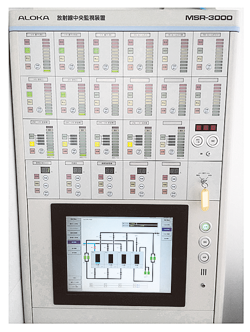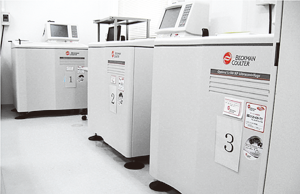
The Radioisotope (RI) Laboratory is adjacent to the main building of the Institute in 1967, and was extended by branch laboratories with a combined space of about 600 sq. m. during the establishment of the North building in 1979 and the Central Laboratory for Biological Hazardous Microbes in 1983. In 1998, a radiation exposure room was established on the first basement level of the South building. The Genome Information Research Center radioisotope laboratory joined in 2007. The main RI Laboratory, the North building RI Laboratory and the Genome Information Research Center radioisotope laboratory were closed in 2010 and 2011. The new RI Laboratory was established in the Immunology Frontier Research Center building in 2011.
The RI Laboratory is designed for biomedical experiments with radioisotopes and plays an important role in the Institute. Its facilities include an RI stockroom, a distribution room, a tissue culture room, and an area for RI measuring equipment. Safety requirements are met by a stringent security system that involves the use of ID cards and the computerized management of radioisotopes. About 200 researchers use this laboratory every year.
